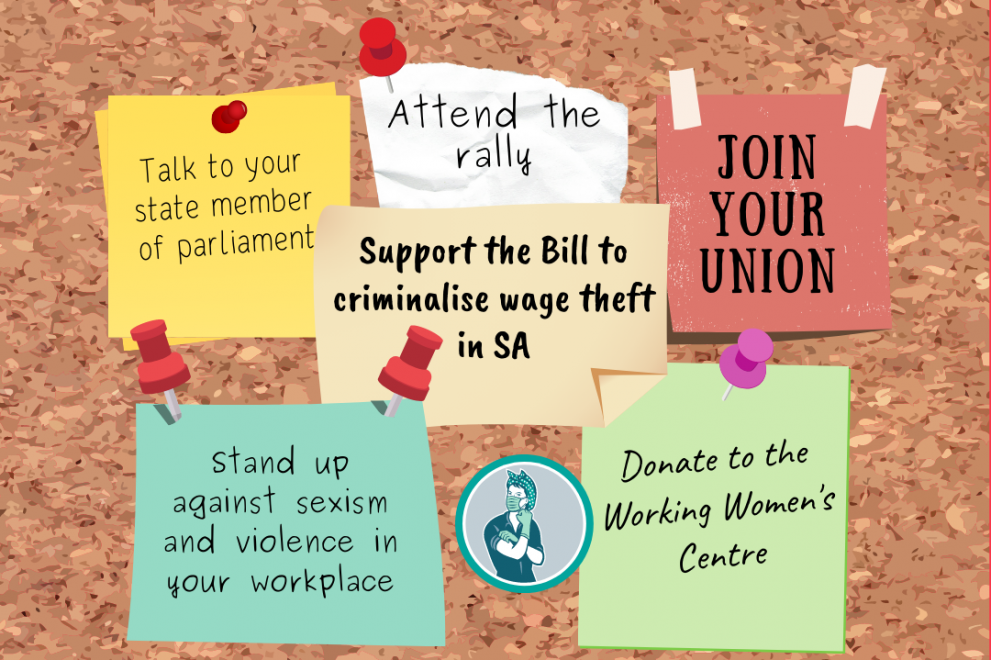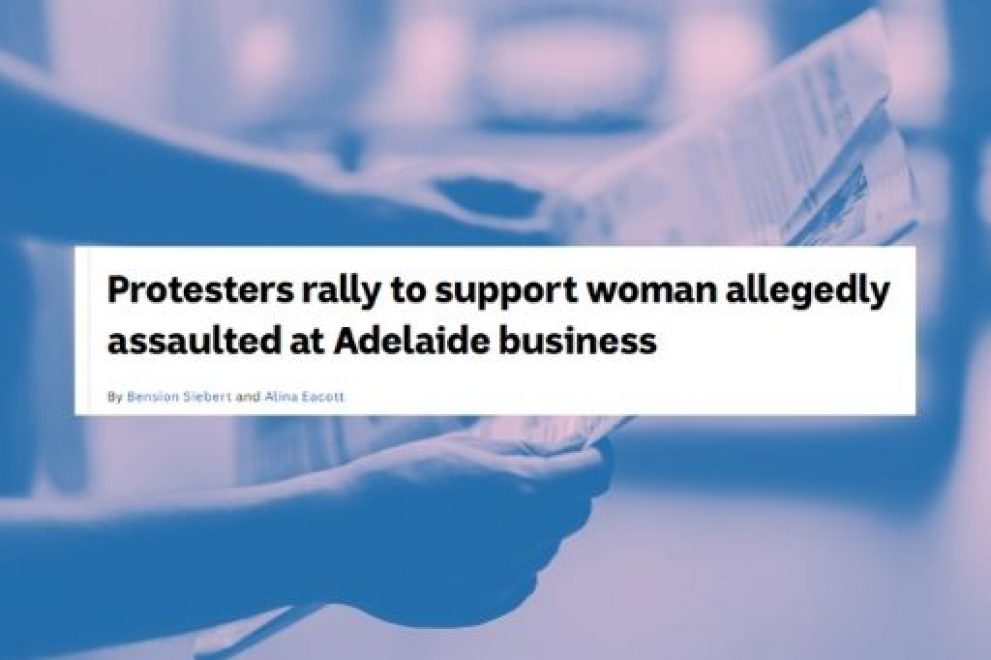Your cart is empty.


Your cart is empty.
The shocking video that many people saw earlier this week is unfortunately a familiar story of wage theft and gendered workplace violence that is common in our South Australian workplaces. Now that a spotlight has been put on the issue, we have the opportunity to change things for the better.

This article was published by ABC News 4th Feb 2021.
Read the full article on the ABC’s website here
Protesters have rallied outside of a cafe where a young woman was allegedly assaulted last week.
Footage of the incident, at Fun Tea in Adelaide’s CBD, went viral on social media and has sparked a conversation about alleged wage theft among the international student community.
It showed a verbal dispute between a man and a woman who makes claims about wage theft.
The man can be heard denying the claims.
Today, protesters claimed wage theft was a problem in businesses in Adelaide’s Chinatown district.
Jackie Chen, from the SA Labour Info Hub, said many people working within the district were paid less than $15 an hour, and some as low as $5 an hour.
“Especially with the background of workers, international students, they are not fluent in English and they don’t know how to find support,” he said.
“We urge the Australian Government to look into these issues.
“We must sort this out, it’s a disaster. It’s been going on for decades.”
He has organised another rally for Saturday to be held in Chinatown.

By filling out this survey between 16th December 2020 and 31st January 2021, you will go in the draw to win one of our fantastic giveaway prizes! If you would like to go in the draw, please make sure you provide us with your contact details. You will have a chance of winning:
Each winner will win one of these giveaways. By filling out the survey, you automatically go in the draw to win one of these prizes as long as you provide us with your contact details.

Work type: Permanent Full time (35 hours)
Sector – Not for Profit
Location – Adelaide
The Working Women’s Centre SA Inc is a not-for-profit organisation that provides an industrial service to vulnerable working women and people. The Centre was established in 1979 and has been advising, supporting and advocating for vulnerable women for 40 years. The Centre provides support, advice, information and representation to women who face issues in their employment in both federal and state jurisdictions. The Centre is also concerned with the structural inequalities for women in the workplace, and conducts outreach, community education, and campaigning for the equal participation of women in the workforce and community.
The position is subject to ongoing funding.
Employment conditions are specified in the Working Women’s Centre SA Inc Enterprise Agreement 2018. Presently, the Senior Advocacy Officer role is not set out in the Enterprise Agreement. The Enterprise Agreement is due for renewal and the classification will be added. Some out of hours work is required.
CONDITIONS:
Competitive salary $86,963.00
Salary Sacrifice available
12.0% superannuation
Flexible workplace
35-hour week (plus reasonable overtime stipulated in the EBA)
TOIL entitlements
WORKING WOMEN’S CENTRE OBJECTIVES
Enhance women and vulnerable people’s participation in and contribution to workplace arrangements that improve their economic prosperity and welfare.
Increase women and vulnerable people’s knowledge of the legal, policy, and institutional frameworks that promote workplace reform, including employment conditions, and fair and efficient arrangements for remuneration and safe work.
Provide a safety net of industrial relations related services to women and vulnerable people who are otherwise unable to access them to enable them to participate effectively in the labour force.
Enhance work-related services provided by other organisations to women and vulnerable people.
The Senior Advocacy Officer is responsible to the Director. The role will require supervision of junior advocacy officers and volunteers to the Centre. The role will require the Senior Advocacy Officer to lead, in conjunction with the Director, campaigns and advocacy projects that relate to the Centre’s objectives. Presently the Centre is engaged in advocacy and campaigning projects on the following issues:
The impact of COVID-19 on young women in South Australia;
Wage Theft;
Sexual Harassment in the Workplace;
The intersection of women’s economic security, precarious work, and family violence;
Increasing the participation of women in male-dominated and non-traditional roles including science, technology, engineering and mathematics (STEM).

Competitive salary $60,000.00
12% superannuation
Flexible workplace
35-hour week (plus reasonable overtime stipulated in the EBA)
TOIL entitlements
A Junior Industrial Officer’s duties are as follows:
Support Senior Industrial Officers to provide information and industrial advice to vulnerable people who are primarily not members of unions and who do not have their own lawyer.
Provide industrial and legal advice across a wide range of federal and state legislation concerning industrial and employment matters.
Support Senior Industrial Officers to represent clients in conciliation, arbitration, and court hearings with respect to industrial claims and disputes.
Work closely with the Director and Senior Industrial Officers on other tasks as required.
The successful candidate will have:
A legal qualification and eligibility to be admitted to practise in South Australia.
An introductory understanding of the Australian Industrial Relations system and workplace law.
An understanding of the role of the Fair Work Act2009 and Fair Work Regulations 2009.
A commitment to principles of unionism
A commitment to gender equity and feminist politics.
Demonstrated abilities in negotiation and conflict resolution.
Demonstrated high level written and oral communication skills.
Exceptional time management skills and demonstrated ability to prioritise tasks.
A demonstrated commitment to the principles of justice and worker’s rights.
Understanding of gender politics and the intersection with labour/employment policy
